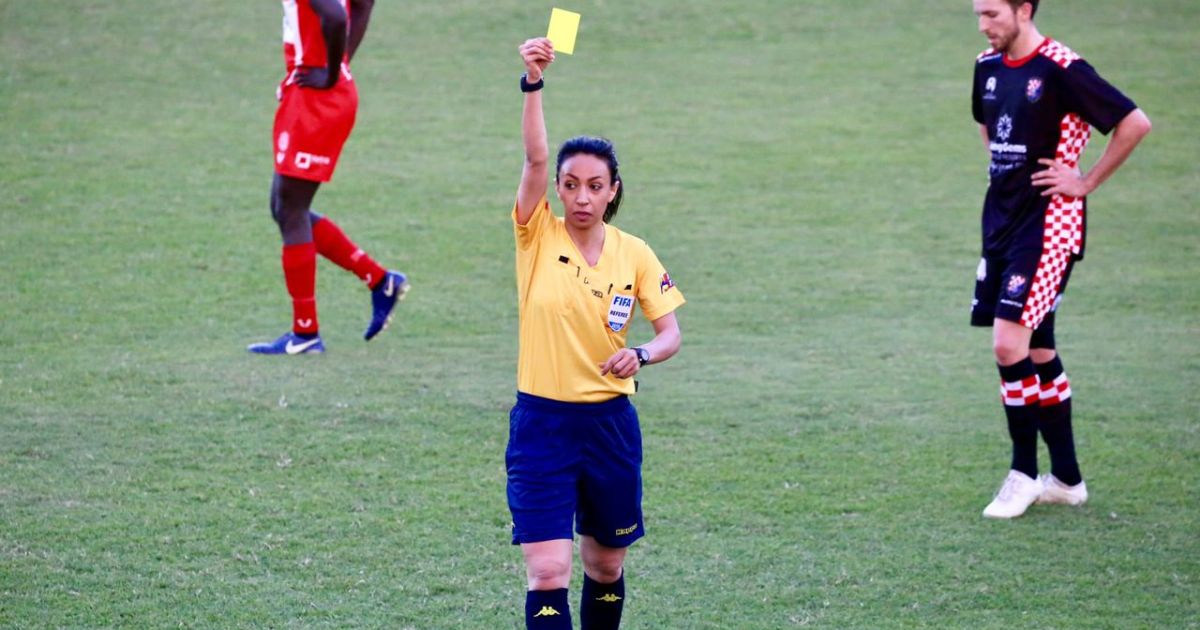For years, Iran’s Mahsa Ghorbani, a pioneering women’s football referee, stood resiliently against social and government restrictions, until she no longer could, and left her home country for Sweden in December.
Born in 1989, Ghorbani’s first experience as an Asian football referee was at the under-14 tournaments. In 2017 she was recognized by FIFA as an elite international referee.
In July, she made sports history as the first Iranian woman to referee an international football match when she officiated the U20 CAFA Championship match between Tajikistan and Afghanistan in the Kyrgyz city of Jalal-Abad.
Previously Ghorbani officiated in the AFC Women’s Asian Cup and 2023 FIFA Women’s World Cup, and also men’s matches in the second division league of the Maldives.
However, the tide turned against Ghorbani when she was appointed as a video assistant referee (VAR) official to monitor a men’s match involving Tehran’s two largest sides, Esteghlal and Persepolis, played on March 13, 2024.
In the days leading up to the high-profile Tehran derby match, she faced widespread official opposition in Iran and her name was removed from the referee list by the Iran Football Federation (IFF) just 48 hours before the fixture, despite support from FIFA, world football’s official governing body.
After facing death threats, insinuations of staged car accidents and acid attacks, and repeated interrogations by the IFF, Ghorbani made a momentous decision to leave Iran.
In a telephone call with the Iran Football Federation’s communications and public relations officer, the organisation was given the opportunity to comment on Ghorbani’s specific allegations of mistreatment. Al Jazeera’s reporter was told that the federation had no comment and that they should not call again.
In this interview, Ghorbani speaks candidly about her love for football, anger at the injustices she faced as a female football referee in Iran, and her hope for a brighter future.
Al Jazeera: Mahsa, why did you decide to emigrate to Sweden?
Mahsa Ghorbani: I reached a point in refereeing where I was one step away from the FIFA World Cup 2022, but the Iran Football Federation (IFF) removed me, under pressure from other [internal] institutions. After the World Cup, there was the Tehran derby incident. They turned officiating a football match into a death threat. They are afraid of giving women space to grow.
One time they said: “Today, you officiate in the VAR room, tomorrow you want to referee on the sidelines, and the day after, you want to be the main referee on the field!” I always wanted to stay and succeed [as a referee] under Iran’s name, but I reached a stage where I faced death threats and realized there was no more room even for one step forward.
Al Jazeera: What threats did you face and from whom?
Mahsa Ghorbani: A few days before the [Tehran derby] match, officials tried to find any justification to bring me to the football federation. When I went there [to the IFF], they switched off my phone and took it. They also said my bag would be kept outside the room.
When I entered the room there were two security representatives and several federation officials present, and they locked the door.
At first, they politely asked me to withdraw from officiating the match. Then they asked me to write a letter saying I was not mentally and psychologically fit to referee this match. Finally, they asked me to sit in front of a camera and say that I was too ill to do it.
Al Jazeera: Why did the Iran Football Federation ask you to do this?
Mahsa Ghorbani: Their [IFF’s] issue wasn’t with the media or the people of Iran. They just wanted a document to present to FIFA to prevent political interference in sports. I did not comply with their demands. However, I later learned that a letter – which I did not write or sign – had been sent by the Federation to FIFA stating that I, Mahsa Ghorbani, due to suffering from a severe illness, was not fit to officiate the Tehran derby.
Al Jazeera: What happened when you refused to write this letter?
Mahsa Ghorbani: They [the IFF] started to use my attire in international matches as an excuse. They asked me to admit in writing that I did not wear the appropriate attire.
Essentially, they wanted me to say that I was “undressed” and intentionally displayed myself. They even threatened me. They said: “If you leave through this door, they will kill you, for example, in a staged accident, so it’s better to cooperate.”
They threatened me multiple times with acid attacks. But my response was always the same: “I would rather die than live without dignity.”
Al Jazeera: What do you wear in international matches?
Mahsa Ghorbani: In most matches, I appeared without a hijab, and despite the pressures, I often said “no” to the Islamic Republic of Iran’s mandatory hijab, meaning I wore the same approved referee uniforms as all referees.
However, when the pressure increased and for the sake of my family’s peace, I wore beige-coloured support socks and hats in some matches.
Al Jazeera: Why didn’t you abide by the approved Iran Football Federation uniform, like other female referees in Iran?
Mahsa Ghorbani: Back then, I felt that this was a step towards freedom for Iranian women and progress towards equality.
In these years, I always had conflicting emotions. Even now, as I recount these events to you, I feel a mixture of happiness and sorrow.
On the one hand, I smile because I managed to fight; but on the other hand, I am sad that we have to fight for the simplest rights that other girls around the world enjoy.
Al Jazeera: One of your dreams was to participate in the FIFA Men’s World Cup. Are you still pursuing this goal?
Mahsa Ghorbani: Participating in the World Cup and international tournaments has always been one of my main goals, and I am still striving to achieve it. I will continue on this path with even more motivation.
I always told those around me that one day, in a major tournament, in an important match, I would enter the field without a mandatory hijab and represent the women of Iran.
I will not spare any effort until I reach this goal. It is important for me not only to elevate my own name but also to proudly represent Iran on the international stage. Every time I think about this, my heart beats faster with excitement because I want to have a place in the hearts of my people.

This article is published in collaboration with Egab.



